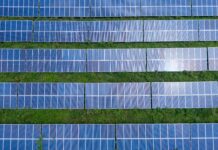Garvin Jabusch
The fossil fuel apologists in the U.S. are of course relentless in their criticism of the solar energy industry. Now with the JinkoSolar (JKS) fluoride spill, though, their hypocrisy is on full display. Earlier this month, they started talking about how Solyndra’s failure means the whole solar concept is flawed (it’s not), and how solar doesn’t work (it does) and how it’s not competitive (it is). Now, JinkoSolar, having spilled fluoride into a river in Haining province, China, is the new whipping boy. The issue though isn’t that solar’s manufacturing processes use some toxic chemicals (we knew that) but that heavy rains caused Jinko’s wastewater containment facilities to overflow into the river. I imagine this is both because the rain was an unusual, unforeseen event and because China lacks the regulatory and enforcement structure to adequately prevent accidents.
Here’s where the hypocrisy comes in. By and large, solar detractors are ideologically the same people who like the idea that “the EPA will have doors locked and lights turned off,” the same people who fail to address the far more toxic U.S. coal industry that routinely releases far more dangerous substances than fluoride, such as arsenic, lead, and mercury (not just in burning coal but also in the mining process, which has also experienced toxic spills). They’re the same folks who don’t mind or ignore small matters like BP using the carcinogen Corexit illegal in the UK to disperse oil in the Gulf of Mexico.
Not that we by any means think a fluoride spill is okay or that China shouldn’t adopt and enforce better regulations to prevent this kind of release; on the contrary. But the pattern is clear. Solar’s detractors don’t care at all about whatever environmental limitations the industry may have (and we would argue that those limitations are few and small compared to those of fossil fuels), but they are desperate to jump on anything that can help them pronounce solar power inferior or even useless.
So let’s keep the issues of safety, relative green merits, and economic effectiveness separate. Regarding regulation, we at Green Alpha ® Advisors are in favor insofar as regulations are fair and exist to protect the well-being of the public. Not all regulations are beneficial. To be honest, within the financial services industry, there are regulations that we believe are preventing our company from expanding business as rapidly and into as many areas as we’d like. But certain basic safeties and rights must be ensured, or things get bad in a hurry.
If we want to know what a nation without some form of workers’ rights looks like, we only need to look at recent labor standards in Saipan or at the U.S. before the horrific Triangle Shirtwaist Factory fire finally inspired adoption of labor rules. And if we want to know what our air and water will be like without environmental regulations, let’s look at China’s deadly air and other issues. We don’t need to experiment with total deregulation In the U.S. we already know what it looks like.
The arguments for solar’s effectiveness are equally simple. Solar works, it is growing fast, creating jobs, and getting cheap enough to soon rival and surpass coal electricity in cost per watt. It is, in many forms, the future of electricity on this planet. Yes, its manufacturing process uses chemicals, which again we knew. So do most industries, many far worse. Solar, if we view the whole process end-to-end, is so much less toxic than coal that even discussing the “dirtiness” of solar by comparison is a joke that would be funny if the resulting coal perpetuation weren’t so deadly and causing climate change. There is no such thing as a perfectly clean, byproduct-free manufacturing process. What we mean by “clean tech” is that, even with its limitations, solar is still far cleaner than the fossil fuel alternatives.
So, the Jinko Solar fluoride leak shows us two things: Solar, even at its worst, is better than coal and that, yes, we do in fact need at least minimal regulation of toxics and enforcement of their release into our air and water. The attempt to now brand solar as dirty and ineffectual is dishonest and misleading, and represents a desperate and ultimately vain attempt to paint it as economically inferior.
It continues to amaze me that in the minds of its detractors, solar does not benefit from normal economics. That is, as solar products get cheaper, people will be installing it in ever bigger and more diverse chunks, resulting in the kind of rapid growth that should be good news for investors.
Jinko Solar, even with its current problem, is a good example. Analyst consensus estimate on Jinko Solar is still “outperform,” which might surprise some who have been misled to believe that ‘solar is over,’ but to me it seems like an easy call. Jinko, set to make $3.71 per share in 2012, has a price to earnings ratio of .84, a price to book of .31, and is trading at only 55% of cash on hand. The US $5.00 per share Jinko is slated to make this year alone is almost equal to its share price. Will the fluoride spill significantly dent earnings? Hardly. The plant will be reopened “within the next few days,” and is one of Jinko’s two manufacturing facilities. I suppose that the event could be damaging to Jinko’s bottom line if the company were hit with large punitive fines, but given the above mentioned lack of regulatory enforcement in China, the fine was only set at US$73,625.03, or six-hundredths of 1% of this year’s earnings.
Solar is the best, net most clean, and ultimately cheapest source of power we know of today (and its base source input (sunlight) is free, unlimited, and enormously powerful). It’s been growing as an industry at a 40 percent compound annual growth rate over the last 10 years, it is America’s fastest growing industry at over 100% in 2010, and it shows no signs of slowing.
All the negative sentiment around solar, present for a while now and currently aided by recent events (events that would have been rated minor, if even noticeable, in almost any other industry), is only presenting stock-buying opportunities. The economics of solar are inevitable and will provide great shareholder return in time. The relatively clean nature of the power derived from solar is a great and ultimately required additional upside. For investors, though, the green part isn’t even the main show.
Garvin Jabusch is chief investment officer at Green Alpha® Advisors, LLC and manages the Green Alpha Next Economy Index, a portfolio of leading Next Economy companies.
This article was first published on his blog Green Alpha’s Next Economy on September 20, 2011.







I am a critic of solar energy, because I approach many things critically, only trying to discern between “belief” and “reality”.
After reading a few lines, I wondered why I would need to feel addressed. All of the accusations, of the “apologists”, “hypocrites” are unspecified.
This article was best left where it was, at “Green Alpha Advisors”, so it would not contaminate this site.